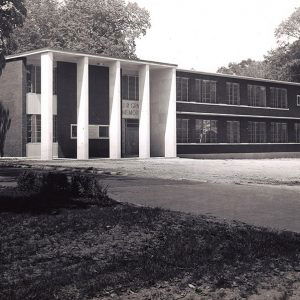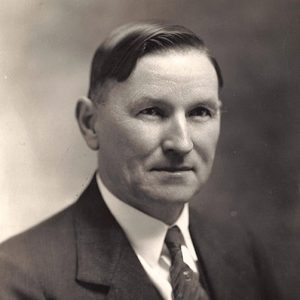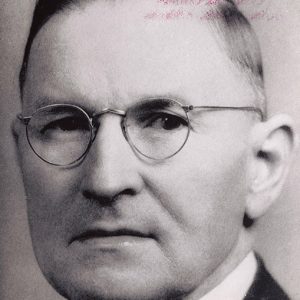calsfoundation@cals.org
James Richard (J. R.) Grant (1880–1951)
James Richard (J. R.) Grant led what is now Ouachita Baptist University (OBU) through difficult years, including during the Great Depression. Serving as president from 1934 through 1949, he equipped Ouachita to provide a quality education to its students and an economically stable institution for donors. Grant dedicated his life to education—in the classroom, at the pulpit, and as a scholar.
J. R. Grant was born on a farm near Dover (Pope County) on March 16, 1880, the seventh of ten children of Daniel Richard Grant and Mary Elizabeth Akins Grant. He had little opportunity for formal classroom instruction in his early years as a farm worker. In 1904, twenty-four-year-old Grant entered the University of Arkansas (UA) in Fayetteville (Washington County) in the preparatory department. For five years, he worked at various jobs around campus, graduating in 1908 with an AB degree.
In August 1910, Grant married his college sweetheart, Gracie Sowers of Monticello (Drew County). Between 1912 and 1923, the couple had five children. The Grants’ middle child, Major George S. Grant, died during the D-Day invasion in World War II. Their youngest son, Daniel Ross Grant, went on to serve as president of Ouachita from 1970 through 1988.
From 1908 to 1926, Grant advanced his career in education, earning numerous degrees and holding increasingly important positions in public and higher education in Arkansas. Each change required the relocation of his growing family. From 1910 to 1911, he performed postgraduate work at Illinois State Teachers College in DeKalb. In 1914, he received an MA from the University of Chicago. From 1918 to 1919, Grant performed doctoral work at Columbia University, eventually earning a PhD from Peabody College in 1925. The completion of this doctorate required two leaves of absence from work, the first without pay.
While steadily progressing in his education, Grant worked as a superintendent of schools at Ola (Yell County) from 1908 to 1910 and Greenwood (Sebastian County) from 1911 to 1912. He also taught at UA, serving as professor of pedagogy and eventually becoming director of training in the College of Education (1913). In 1920, Grant took a position with the Arkansas Department of Education as state supervisor of rural schools, a position he held for six years.
In 1926, Arkansas Polytechnic Institute (now Arkansas Tech University) offered Grant the position of president. Under Grant’s leadership, Arkansas Polytechnic saw substantial increases in student enrollment, increases in the number of degree-holding faculty, and the expansion of the library. The institution grew into a four-year school and earned accreditation through the North Central Association. In 1931, despite Grant’s successes, several members of the institute’s board of trustees decided to enforce a caveat in the 1909 bill establishing the school that required the president to be a graduate of a standard agricultural school. Grant resigned after the board announced its intention to enforce the twenty-two-year-old rule.
The next year, Grant took a position at Ouachita Baptist College as professor of education and registrar. Financial issues plagued the college during this time. Student enrollment declined as the state established more-affordable public institutions. Faculty members left for better-paying jobs, and the college lost accreditation from the North Central Association. The Arkansas Baptist State Convention, at the urging of Ouachita president Charles Johnson, established an education commission to assess the continued viability of the college, and Grant was appointed to serve on the commission.
In April 1933, President Johnson announced his resignation from Ouachita. Grant ran the college as vice president until the trustees formally elected him president on January 30, 1934. Grant’s presidency marked a turning point for the college, which had narrowly averted relocation from Arkadelphia (Clark County) two years prior. (Perhaps because of his role on the education commission, Grant was able to allay any residual concerns about the college’s sustainability.) Grant’s leadership revitalized the image of Ouachita among Southern Baptists. His warm, dignified enthusiasm was infectious. Student enrollment increased by eighty percent during his first two years. He encouraged the trustees to let Ouachita run on its income, so that the school would not incur more debt to pay for basic needs. This policy gave Ouachita the improved financial status that imbued donors with the confidence to give more than $2,000,000 during the next ten years. These funds were used for paying debt, renovating and constructing buildings, paying faculty, and restructuring curriculum and departments. By 1942, Ouachita had regained accreditation.
In 1935, Grant co-authored Arkansas: Yesterday and Today with author Faith Yingling Knoop; the textbook was used in Arkansas schools for almost twenty-five years.
In 1949, Grant retired due to declining health. At his final commencement, he was awarded an honorary Doctor of Law degree. He and his wife retired to Little Rock (Pulaski County), where he continued to write, lecture, and preach until his death on November 4, 1951. He is buried in Roselawn Memorial Park in Little Rock. In June 1953, Ouachita dedicated the J. R. Grant Memorial Hall administration building. The building was torn down in 1995.
For additional information:
Arrington, Michael. Ouachita Baptist University: The First 100 Years. Little Rock: August House, 1985.
“Dr. James Richard Grant.” Findagrave.com. https://www.findagrave.com/memorial/7263941/james-richard-grant (accessed July 13, 2022).
Hall, Harriet Grant. Green Shoot from Gum Log: A Biography of James Richard Grant—College President and American Humorist. New York: The William-Frederick Press, 1953.
UA Administrative Offices: President’s Office: Biographies: Grant, James R. Ouachita Baptist University Special Collections and Archives, Ouachita Baptist University, Arkadelphia, Arkansas.
Williams, C. Fred, Ray Granade, and Kenneth M. Startup. A System & Plan: Arkansas Baptist State Convention, 1848–1998. Franklin: Providence House Publishers, 1998.
Sarah Spakes
Ouachita Baptist University










Comments
No comments on this entry yet.